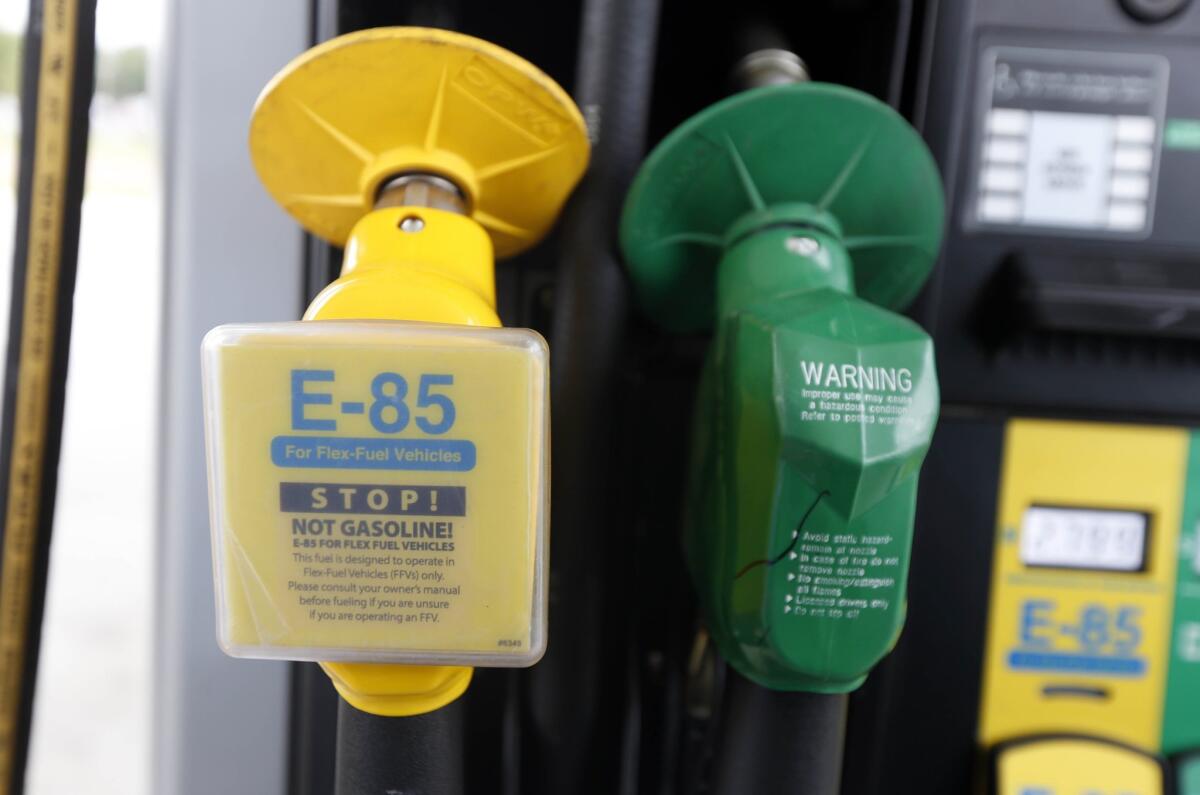EPA boosts amount of ethanol in gasoline supply

The EPA is boosting the amount of corn-based ethanol in the U.S. gasoline supply.
- Share via
The Obama administration is boosting the amount of corn-based ethanol and other renewable fuels in the U.S. gasoline supply despite sustained opposition by an unusual alliance of oil companies, environmentalists and some GOP presidential candidates.
The Environmental Protection Agency on Monday issued a final rule designed to increase production of ethanol to be blended with gasoline through 2016, a decision that could reverberate in Iowa’s crucial presidential caucuses.
The agency said it will require more than 18 billion gallons of renewable fuels in 2016, most of it ethanol. The amount is less than was set in a 2007 renewable fuels law, but is more than was proposed by the EPA in May. The agency said that the demand for gasoline has risen since May, increasing the amount of renewable fuels that can be blended in.
The decision doesn’t necessarily mean a higher percentage of ethanol in an individual driver’s tank, and isn’t likely to have much effect on gas prices. But it does mean there will a higher supply of the home-grown fuel overall.
More renewable fuels are good news for farm country. But ethanol critics say the levels are too high.
Oil companies have spent many years fighting the 2007 law, saying the market, not the government, should determine how much ethanol is blended into their gas. Environmental groups say that farmers growing large amounts of corn for ethanol are tearing up the land. And conservatives like Texas Sen. Ted Cruz, who is running for the Republican presidential nomination, call the government’s longtime support for ethanol “corporate welfare.”
The renewable fuels law sought to address global warming, reduce dependence on foreign oil and bolster the rural economy by requiring a steady increase in the overall amount of ethanol and other renewable fuels blended into gasoline over time. The Renewable Fuel Standard, as it is called, sets out specific yearly targets.
NEWSLETTER: Get the day’s top headlines from Times Editor Davan Maharaj >>
Since then, the EPA has said the standards set by the law cannot be fully reached due partly to limits on the amount of renewable fuels other than ethanol that can be produced. Next-generation biofuels, made from agricultural waste such as wood chips and corncobs, have not taken off as quickly as Congress required and the administration expected.
Still, the new rule setting targets for 2015, 2016 and retroactively for 2014 would represent an overall increase in the use of renewable fuels.
The new standards come as President Barack Obama and other world leaders are meeting in Paris to finalize an agreement to cut carbon emissions worldwide, and the administration says this will help achieve that goal.
The new targets are a victory for the ethanol industry, which aggressively pushed back on a 2013 proposal that would have decreased the amount of ethanol mixed into fuel. At the time, the EPA said the amount of biofuel required would generate more ethanol than many engines can safely handle.
Farm-state lawmakers — and some presidential candidates wanting to win over voters in farm states like Iowa — have strongly urged the EPA to meet the targets set out in the law. They have also successfully pushed back on calls from opponents to repeal the entire Renewable Fuel Standard. So far, the critics have had little luck getting past those supporters to change the policy in Congress.
In the presidential race, Democratic front-runner Hillary Clinton has said she will seek to strengthen the standards, and her fellow Democratic candidates have also supported it.
The issue has divided Republicans seeking the presidency.
While some candidates like former Arkansas Gov. Mike Huckabee have spoken about maintaining higher levels of renewable fuels, others like Cruz have denounced the policy. Florida Sen. Marco Rubio has positioned himself somewhere in the middle, saying the standard should not be repealed because many have made investments in it but it should be eventually phased out.
Iowa, host of the leadoff presidential caucuses next year, produces more ethanol than any other state, and the renewable fuel standard is a powerful economic and political issue. But as national security and the economy have eclipsed farming issues in many rural areas, some candidates like Cruz have felt comfortable criticizing it and have still fared well in the polls.
In March, Cruz told an audience at an Iowa agricultural forum that he has “every bit of faith that businesses can continue to compete, continue to do well without going on bended knee to the government.”
ALSO
Climate change talks begin in Paris; Obama warns against cynicism
UC joins Bill Gates’ clean energy coalition with $1-billion investment
Supreme Court lets stand Texas law limiting online advice from veterinarians about sick pets
More to Read
Inside the business of entertainment
The Wide Shot brings you news, analysis and insights on everything from streaming wars to production — and what it all means for the future.
You may occasionally receive promotional content from the Los Angeles Times.










